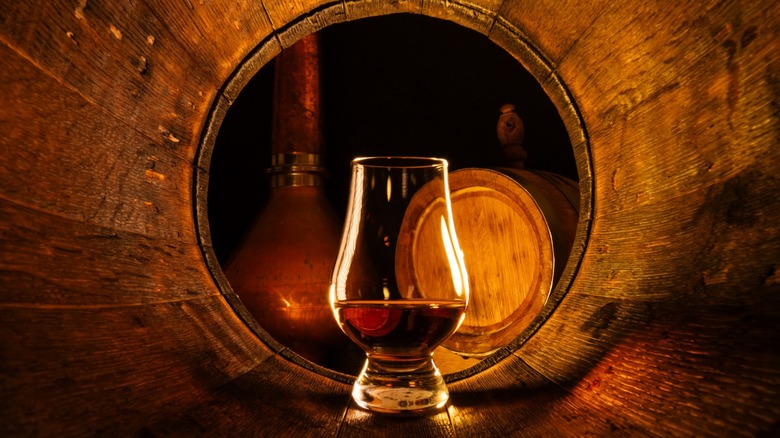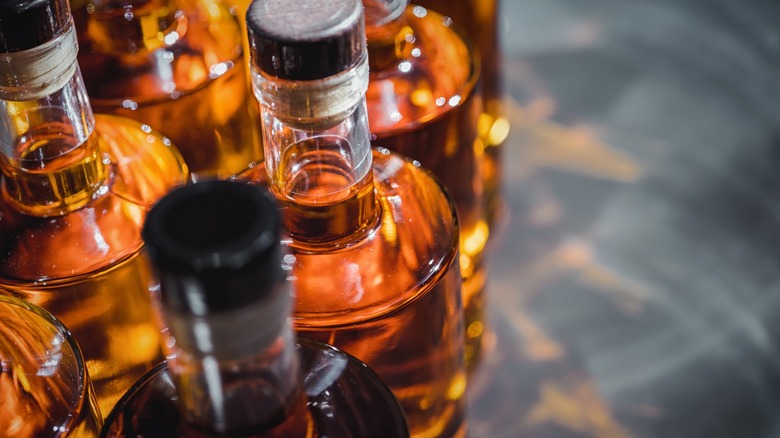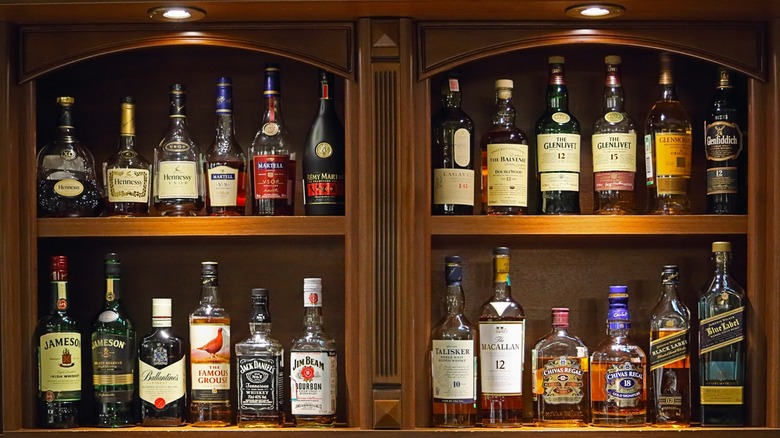The Storage Mistake That Spoils Your Whiskey
A good whiskey is not only a worthwhile bottle for your home shelf but, indeed, something you can build an entire bar around. In fact, whiskey is one of the most important liquors you can have available in your domicile. You might even have multiple whiskeys, which each bring their own unique tastes. Some of them might even be on the pricier side as you get more acquainted with the liquor. With this in mind, you want to make sure that you're storing your whiskey correctly. You can store vodka in the freezer for a smoother finish, and there are multiple tips for storing wine, but how should you store whiskey?
Ideally, like most liquors, cool and dry areas are preferred. But the most important thing to know is that you should not store your whiskey in such a way that the liquor is in constant contact with its cork. This may astound some since it's recommended to store other alcoholic drinks, such as wine, so that the cork stays in contact with the liquid inside. But this should be avoided when it comes to storing whiskey.
Whiskey will wear away your cork
A problem that some home bar enthusiasts have is the plight of dry corks, which can lead to an improper seal on your bottles and therefore cause avoidable oxidation. Oxidation can destroy your drink's flavor, so you'll want to ward it off at all costs. You can avoid a dry cork by implementing a weekly cork ritual of shaking the bottle to make sure the liquid occasionally touches the cork. But make no mistake, you can overcorrect and have your liquor soak the cork too much, especially with hard liquors like whiskey, which will be a bare minimum of 40% ABV, or alcohol by volume.
When whiskey (or any highly alcoholic liquid for that matter) is constantly soaking the cork of its bottle, it slowly disintegrates the cork. Not only does this cause an improper seal no different than if the cork was too dry, but this bad seal can also cause your whiskey to evaporate more quickly, as gradual as that process may be. But perhaps worst of all, the soaked cork material doesn't just disappear –- it ends up as residue in your whiskey, and that's no fun for anyone.
How should you store whiskey then?
Naturally, you want to avoid all of the detrimental effects of cork disintegration in your whiskey. As such, storing whiskey upright is the best way to avoid all of these problems, as long as you soak the cork every now and then to keep the balance. As well, it's recommended to keep whiskey in a cool, dry place sheltered from most (if not all) direct light, as constant light exposure can also damage your whiskey. It's also best to avoid extreme temperatures in both directions –- you don't want whiskey in a place that's too hot or too cold. So unfortunately, the door of your fridge or the cupboard next to your oven are not ideal storage locations, and will likely alter the spirit in question.
A closed cupboard or cabinet far enough away from light and extreme temperatures is ideal. And with your newfound insight about your whiskey's relationship to its cork, you now know not to opt for the wine-rack storage method when it comes to your fermented grain spirit. And with the whiskey no longer posing any issues, you can shift your focus to other important matters of mixology, such as how to level up a mediocre whiskey or even learning just how important the right lemon juice is in a whiskey sour.


